- Home
- Robin Hobb
The Inheritance and Other Stories Page 7
The Inheritance and Other Stories Read online
Page 7
“Go after her!” I screamed. “Get her back. They just took her.”
“No.” She said each word carefully, signing them for emphasis: “They didn’t take her. She wanted to go. She had to go. She shouldn’t have to come back, not just for us.”
“You can’t know that!” I yelled. “How can you say that?”
She looked at me a long time. “Because I heard it,” she signed slowly, silently. I watched her scarred fingers move, the wonder that flooded her face. “I heard it, and it called me. But it wasn’t for me, not the me that’s here. It was for the other me, the one you made. The one you made for them. The circle closer. The one who listens so well that she has no need to speak. The me done right. But this me heard it and knew how bad she wanted to go.”
Then Mom went back in her room and closed her door.
Nothing happened after that. The fat Skoag never came back, and Mom never went through withdrawal. I guess the last song was enough to last her forever. I never went to school again, and the government people never came to ask about us. They never came to tell us anything either. There were no write-ups in the paper, no news stories about a little girl stolen by the Skoags. No one ever asked why Lisa never came to school. No one ever asked just how much one little girl is worth to the government. Or to a Skoag with a purple crest.
But the next month Boeing got a huge government contract that put half of Seattle back to work, and the papers were full of news about the breakthrough design that could give us the stars. So I didn’t need it spelled out. Do you?
The world gets the stars, the Skoags get Lisa, and I get nothing. Lisa’s gone, and with her every touch of Lavender. It was a hard thing he asked of me, but I did it. I looked after the Mom. The Skoags can go back home now. Every day, there are fewer of them on the streets. They always bow to my mom and me. They no longer sing, but all their crests ripple with color. Sometimes I wonder if Lavender even knew what he was asking.
Or maybe all he meant was that I should look out for Mom, and the rest of it was just an accident. I don’t know.
Mom and I still live here. Next month I’ll be eighteen. I’ll have to register with the aid office as an adult, and with the job office for training. Mom’s Career Mother checks will stop and she’ll have to get job training or lose all her aid. I’ll have to move out, because aid receivers aren’t allowed to let other adults share their homes. Mom will probably get a smaller place.
That’s too bad. Because just last night, as I was falling asleep on the couch, I heard a mouse, nibbling inside there.
It’s been a good home, really. I had good folks.
Silver Lady and the Fortyish Man
This story was written in 1988 as a fortieth birthday present for my husband, Fred.
Since the early 1970s I’d had an agreement with my husband. He didn’t read my fiction. He didn’t read it in draft form or before I sent it out. He didn’t even read it after it had been published. It was a wall we’d put in place after we realized that we simply knew each other too well. I could shrug off criticism from any other reader, but not from him. He was simply too good at putting his finger unerringly on exactly my greatest doubt.
Writing fiction, my friend, is a game of sleight of hand that a writer plays with her- or himself. The writer takes key events, dazzling pains, gasping joys, and unutterable boredom and weaves them into a story that is always, inevitably, about the writer’s own life. The trick is to write it in such a way that the writer does not know he or she is merely holding up a very large and distorted mirror of the writer’s life. It is my opinion that the only way writers can serve up their own steaming entrails on a platter and not know they are offering their own vital essence to the world is by disguising it.
And I was never able to disguise it well enough from Fred. He would read a story, a story that wasn’t about me or us or any time or place we had ever lived, and then he’d say, “Oh, yeah, I remember that day. That was awful, wasn’t it?”
And suddenly I’d see the roots of my own tale. And be unable to even finish polishing the story, let alone put it out there for sale. There were two choices for me. I’d either have to give up being a writer or ask Fred not ever to read anything I wrote. I chose the second alternative, and to this day, he has kept his word. The sole exception is this story, “Silver Lady and the Fortyish Man.” It was written for him, as a gift, and he read it. And had the great good sense to not point out exactly where and how it intersected with my reality.
I do think that every freelance writer reaches a point at which he or she says, “If I quit trying to write fiction and just spent those hours working for someone else for minimum wage, I’d come out dollars ahead.” I know I certainly have, and more than once. In the speckled years of my writing career, I’ve served pizza, pulled beers, delivered the US mail, sold consumer electronics, managed an electronics store, and yes, worked as a salesperson in the ladies’ clothing department of a Sears store. And at times like that, when a writer is not writing, sometimes someone else believing in you is what it takes to put the world back on track.
And thereby hangs a tale . . .
It was about 8:15 P.M. and I was standing near the register in a Sears in a substandard suburban mall the first time the fortyish man came in. There were forty-five more minutes to endure before the store would close and I could go home. The Muzak was playing, and a Ronald McDonald display was waving at me cheerily from the children’s department. I was thinking about how animals in traps chew their legs off. There was a time when I couldn’t understand that type of survival mechanism. Now I could. I was wishing for longer, sharper teeth when the fortyish man came in.
For the last hour or so, salespeople had outnumbered customers in the store. A dead night. I was the only salesperson in Ladies’ Fashions and Lingerie, and I had spent the last two hours straightening dresses on hangers, zipping coats, putting T-shirts in order by size and color, clipping bras on hangers, and making sure all the jeans faced the same way on the racks. Now I was tidying up all the bags and papers under the register counter. Boredom, not dedication. Only boredom can drive someone to be that meticulous, especially for four dollars an hour. One part boredom to two parts despair.
So a customer, any kind of a customer, was a welcome distraction. Even a very ordinary fortyish man. He came straight up to my counter, threading his way through the racks without even a glance at the dresses or sweaters or jeans. He walked straight up to me and said, “I need a silk scarf.”
Believe me, the last thing this man needed was a silk scarf. He was tall, at least six feet, and had reached that stage in his life where he buckled his belt under his belly. His dark hair was thinning, and the way he combed it did nothing to hide the fact. He wore fortyish-man clothing, and I won’t describe it, because if I did you might think there was something about the way he dressed that made me notice him. There wasn’t. He was ordinary in the most common sense of the word, and if it had been a busy night in the store, I’d never even have seen him. So ordinary he’d be invisible. The only remarkable thing about him was that he was a fortyish man in a Sears store on a night when we had stayed open longer than our customers had stayed awake. And that he’d said he needed a silk scarf. Men like him never buy silk scarves, not for any reason.
But he’d said he needed a silk scarf. And that was a double miracle of sorts, the customer knowing what he wanted, and I actually having it. So I put on my sales smile and asked, “Did you have any particular color in mind, sir?”
“Anything,” he said, an edge of impatience in his voice. “As long as it’s silk.”
The scarf rack was right by the register, arranged with compulsive tidiness by me earlier in the shift. Long scarves on the bottom rack, short scarves on the top rack, silk to the left, acrylics to the right, solid colors together in a rainbow spectrum on that row, patterns rioting on that hook, all edges gracefully fluted. Scarves were impulse sales, second sales, “wouldn’t you like a lovely blue scarf to go with that sweater
, miss?” sales. No one marched into a Sears store at 8:15 at night and demanded a silk scarf. People who needed silk scarves at 8:15 at night went to boutiques for them, little shops that smelled like perfumes or spices and had no Hamburglars lurking in the aisles. But this fortyish man wouldn’t know that.
So I leaned across the counter and snagged a handful, let my fingers find the silk ones and pull them gently from their hooks. Silk like woven moonlight in my hands, airy scarves in elusive colors. I spread them out like a rainbow on the counter. “One of these, perhaps?” I smiled persuasively.
“Any of them, it doesn’t matter, I just need a piece of silk.” He scarcely glanced at them.
And then I said one of those things I sometimes do, the words falling from my lips with sureness, coming from God knows where, meant to put the customer at ease but always getting me into trouble. “To wrap your tarot cards, undoubtedly.”
Bingo, I’d hit it. He lifted his eyes and stared at me, as if suddenly seeing me as a person and not just a saleswoman in a Sears at night. He didn’t say anything, just looked at me. It was like having crosshairs tattooed on my forehead. In exposing him, I had exposed myself. Something like that. I cleared my throat and decided to back off and get a little more formal.
“Cash or charge?” I asked, twitching a blue one from the slithering heap on the counter, and he handed me a ten and dug for the odd change. I stuffed the scarf in a bag and clipped his receipt on it and that was it. He left, and I spent the rest of my shift making sure that all the coat hangers on the racks were exactly one finger space apart.
I had taken the job in November, hired on in preparation for the Christmas rush, suckered in by the hope that after the New Year began I would become full-time and get better wages. It was February, and I was still getting less than thirty hours a week and only four dollars an hour. Every time I thought about it, I could feel rodents gnawing at the bottom of my heart. There is a sick despair to needing money so desperately that you can’t quit the job that doesn’t pay you enough to live on, the job that gives you just enough irregular hours to make job hunting for something better next to impossible. Worst of all was the thought that I’d fashioned and devised this trap myself. I’d leapt into it, in the name of common sense and practicality.
Two years ago I’d quit a job very similar to this one, to live on my hoarded savings and dreams of being a freelance writer. I’d become a full-time writer, and I loved it. And I’d almost made it. For two years I skimped along, never much above poverty level, but writing and taking photographs, doing a little freelance journalism to back up the fiction, writing a story here, a story there, and selling them almost often enough to make ends meet.
Almost.
How the hell long can anyone live on almost? Buying almost new clothes at the secondhand store, almost fresh bread at the thrift store, almost stylish shoes at the end-of-season sales. Keeping the apartment almost warm, the dripping, rumbling refrigerator keeping food almost cold, telling my friends I was almost there. Almost writing the one really good story that would establish me as a writer to be reckoned with. I still loved it, but I started to notice little things. How my friends always brought food when they came to visit, and my parents sent money on my birthday, and my sister gave me “hand-me-downs” that fit me perfectly, and, once, still had the tags on.
This is fine, when you are twenty or so, and just striking out on your own. It is not so good when you are thirty-five and following your chosen career. One day I woke up and knew that the dream wasn’t going to come true. My Muse was a faithless slut who drank all my wine and gave me half a page a day. I demanded more from her. She refused. We quarreled. I begged, I pleaded, I showed the mounting stacks of bills, but she refused to produce. I gave her an ultimatum, and she ignored me. Left me wordless, facing empty white pages and a stack of bills on the corner of my desk. One of two things happened to me then. I’ve never decided which it was. Some of my friends told me I’d lost faith. Others said I’d become more practical. I went job hunting.
In November, I reentered the wonderful world of retail merchandising to work a regular nine-to-five job and make an ordinary living, with clockwork paychecks and accounts paid the first time they billed me. I’d leapt back into salesmanship with energy and enthusiasm, pushing for that second sale, persuading women to buy outfits that looked dreadful on them, always asking if they wanted to apply for our charge card. I’d been a credit to the department. All management praised me. But no one gave me a raise, and full-time hours were a mirage on the horizon. I limped along, making almost enough money to make ends meet. It felt very familiar. Except that I didn’t love what I did. I was stuck with it. I wasn’t any better off than I had been.
And I wasn’t writing anymore, either.
My Muse had always been a fickle bitch, and the moment I pulled on pantyhose and clipped on an “I Am SEARS” tag, she moved out, lock, stock, and inspiration. If I had no faith in her power to feed me, then to hell with me was the sentiment as she expressed it. All or nothing, that was her, like my refrigerator, either freezing it all or dripping the vegetable bin full of water. All or nothing, no halfway meetings.
So it was nothing, and my days off were spent, not pounding the keys, but going to the Laundromat, where one can choose between watching one’s underwear cavort gaily in the dryer window or watching gaunt women in mismatched outfits abuse their children. (“That’s it, Bobby! That’s it, I absolutely mean it, you little shit! Now you go stand by that basket and you hold on to it with both hands, and don’t you move until I tell you you can. You move one step away from that basket and I’m going to whack you. You hear me, Bobby? YOU Whack! GET YOUR Whack! HANDS ON THAT Whack! BASKET! Now shut up or I’ll really give you something to cry about!”) I usually watched my underwear cavorting through the fluff-dry cycle.
And so I worked at Sears, from nine to one, or from five to nine, occasionally getting an eight-hour day, but seldom more than a twenty-four-hour week, watching income not quite equal outgo, paying bills with a few dollars and many promises, spacing it out with plastic, and wondering, occasionally, what the hell I was going to do when it all caught up with me and fell apart.
Days passed. Not an elegant way to express it, but accurate. So there I was again, one weekday night, after eight, dusting the display fixtures and waiting for closing time, wondering why we stayed open when the rest of the mall closed at seven. And the fortyish man came in again. I remembered him right away. He didn’t look any different from the first time, except that this time he was a little more real to me because I had seen him before. I stood by my counter, feather duster in hand, and watched him come on, wondering what he wanted this time.
He had a little plastic container of jasmine potpourri, from the bath and bedding department. He set it on the counter and asked, “Can I pay for this here?”
I was absolutely correct as a salesperson. “Certainly, sir. At Sears, we can ring up purchases from any department at any register. We do our best to make things convenient for our customers. Cash or charge?”
“Cash,” he said, and as I asked, “Would you like to fill out an application for our Sears or Discover charge card? It makes shopping at Sears even more convenient, and in addition to charging, either card can be used as a check cashing card,” he set three Liberty Walking silver dollars, circa 1923, on the plastic countertop between us. Then he stood and looked down at me, like I was a rat and he’d just dropped a prefab maze into place around me.
“Sure you want to use those?” I asked him, and he nodded without speaking.
So I rang up the jasmine potpourri and dropped the three silver dollars into the till, wishing I could keep them for myself, but we weren’t allowed to have our purses or any personal cash out on the selling floor, so there was no way I could redeem them and take them home. I knew someone would nab them before they ever got to the bank, but it wasn’t going to be me, and wasn’t that just the way my whole life had been going lately? The fortyish man took his jasm
ine potpourri in his plastic Sears bag with the receipt stapled on the outside of it and left. As he left, I said, “Have a nice evening, sir, and thank you for shopping at our Sears store.” To which he replied solemnly, “Silver Lady, this job is going to kill you.” Just like that, with the capital letters in the way he said it, and then he left.
Now I’ve been called a lot of things by a lot of men, but Silver Lady isn’t one of them. Mud duck. More of a mud duck, that’s me, protective coloring, not too much makeup, muted colors in my clothes, unobtrusive jewelry if any at all. Camouflage. Dress just enough like anyone else so that no one notices you, that’s the safest way. In high school, I believed I was invisible. If anyone looked at me, I would pick my nose and examine it until they looked away. They hardly ever looked back. I’d outgrown those tricks a long time ago, of course, but Silver Lady? That was a ridiculous thing to call me, unless he was mocking me, and I didn’t think he had been. But somehow it seemed worse that he had been serious; it stung worse than an insult, because he had seemed to see in me something that I couldn’t imagine in myself. Stung all the sharper because he was an ordinary fortyish man, run of the mill, staid and regular, potbelly and thinning hair, and it wasn’t fair that he could imagine more about me than I could about myself. I mean, hell, I’m the writer, the one with the wild imagination, the vivid dreams, the razor-edged visions, right?
So. I worked out my shift, chewing on my tongue until closing time, and it wasn’t until I had closed my till, stapled my receipts together, and chained off the dressing room that I noticed the little box on the corner of my counter. Little cardboard jewelry box, silver tone paper on the outside, no bag, no label, no nothing, just the silver stripes and Nordstrom in elegant lettering on the outside. A customer had forgotten it there, and I shoved it into my skirt pocket to turn it in at Customer Convenience on my way out.

 Ship of Destiny
Ship of Destiny Golden Fool
Golden Fool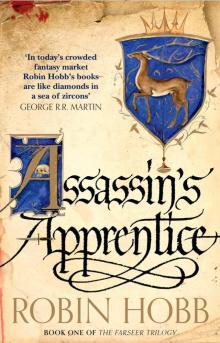 Assassins Apprentice
Assassins Apprentice The Dragon Keeper
The Dragon Keeper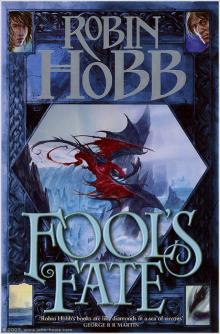 Fools Fate
Fools Fate Fools Errand
Fools Errand Fools Assassin
Fools Assassin The Mad Ship
The Mad Ship Shamans Crossing
Shamans Crossing Ship of Magic
Ship of Magic City of Dragons
City of Dragons Dragon Haven
Dragon Haven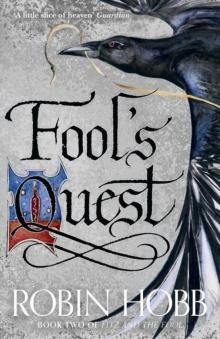 Fools Quest
Fools Quest Blood of Dragons
Blood of Dragons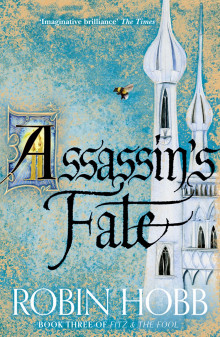 Assassin's Fate
Assassin's Fate Assassins Quest
Assassins Quest Renegades Magic
Renegades Magic Forest Mage
Forest Mage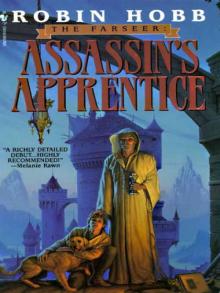 Assassin's Apprentice tft-1
Assassin's Apprentice tft-1 Assassin's Quest tft-3
Assassin's Quest tft-3 Royal Assassin
Royal Assassin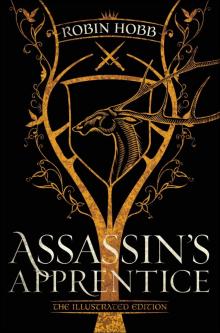 Assassin's Apprentice (The Illustrated Edition)
Assassin's Apprentice (The Illustrated Edition) Assassin's Quest (UK)
Assassin's Quest (UK) Royal Assassin (UK)
Royal Assassin (UK)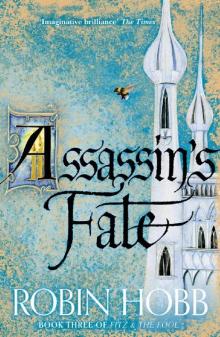 FF3 Assassin’s Fate
FF3 Assassin’s Fate Royal Assassin tft-2
Royal Assassin tft-2 Fool’s Assassin: Book One of the Fitz and the Fool Trilogy
Fool’s Assassin: Book One of the Fitz and the Fool Trilogy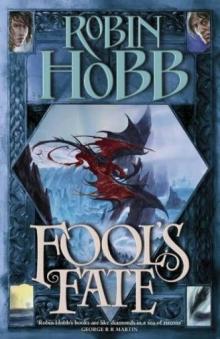 Fool's Fate ttm-3
Fool's Fate ttm-3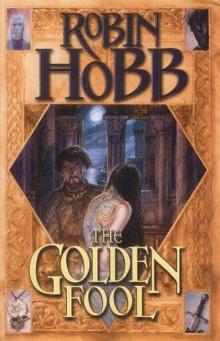 The Golden Fool ttm-2
The Golden Fool ttm-2 The Liveship Traders Series
The Liveship Traders Series The Wilful Princess and the Piebald Prince
The Wilful Princess and the Piebald Prince City of Dragons rwc-3
City of Dragons rwc-3 The Tawny Man 1 - Fool's Errand
The Tawny Man 1 - Fool's Errand Words Like Coins
Words Like Coins The Complete Tawny Man Trilogy Omnibus
The Complete Tawny Man Trilogy Omnibus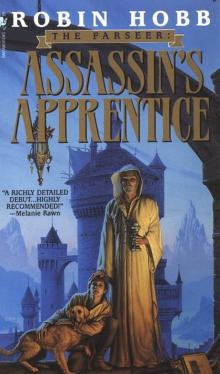 Farseer 1 - Assassin's Apprentice
Farseer 1 - Assassin's Apprentice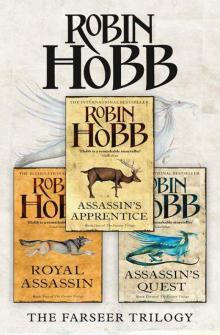 The Complete Farseer Trilogy Omnibus
The Complete Farseer Trilogy Omnibus The Soldier Son Trilogy Bundle
The Soldier Son Trilogy Bundle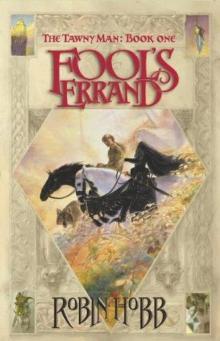 Fool's Errand ttm-1
Fool's Errand ttm-1 Blue Boots
Blue Boots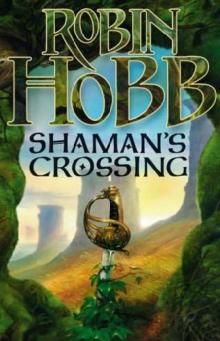 Shaman's Crossing ss-1
Shaman's Crossing ss-1 Mad Ship
Mad Ship Dragon Keeper
Dragon Keeper The Willful Princess and the Piebald Prince
The Willful Princess and the Piebald Prince Ship of Destiny tlt-3
Ship of Destiny tlt-3 Rain Wild Chronicles 02 - Dragon Haven
Rain Wild Chronicles 02 - Dragon Haven The Dragon Keeper trwc-1
The Dragon Keeper trwc-1 The Triumph
The Triumph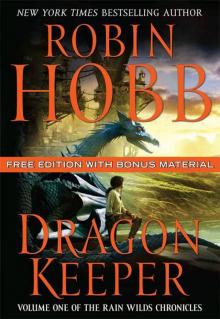 Dragon Keeper Free Edition with Bonus Material
Dragon Keeper Free Edition with Bonus Material Mad Ship tlt-2
Mad Ship tlt-2 The Inheritance and Other Stories
The Inheritance and Other Stories Tawny Man 02 - Golden Fool
Tawny Man 02 - Golden Fool Farseer 2 - Royal Assassin
Farseer 2 - Royal Assassin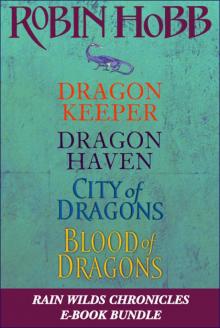 Rain Wilds Chronicles
Rain Wilds Chronicles Forest Mage ss-2
Forest Mage ss-2 Ship of Magic lt-1
Ship of Magic lt-1 Renegade's Magic ss-3
Renegade's Magic ss-3